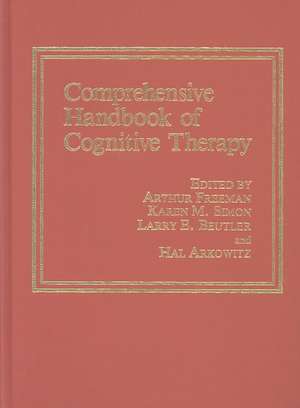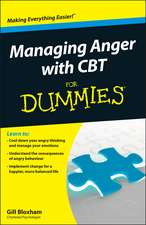Comprehensive Handbook of Cognitive Therapy
Editat de Hal Arkowitz, L.E. Beutler, Karen M. Simonen Limba Engleză Hardback – 30 iun 1989
This book provides a welcome and readable overview of these advances.
| Toate formatele și edițiile | Preț | Express |
|---|---|---|
| Paperback (1) | 1819.79 lei 6-8 săpt. | |
| Springer Us – 26 apr 2013 | 1819.79 lei 6-8 săpt. | |
| Hardback (1) | 1898.79 lei 6-8 săpt. | |
| Springer Us – 30 iun 1989 | 1898.79 lei 6-8 săpt. |
Preț: 1898.79 lei
Preț vechi: 1998.73 lei
-5% Nou
Puncte Express: 2848
Preț estimativ în valută:
363.37€ • 378.89$ • 301.100£
363.37€ • 378.89$ • 301.100£
Carte tipărită la comandă
Livrare economică 20 martie-03 aprilie
Preluare comenzi: 021 569.72.76
Specificații
ISBN-13: 9780306430527
ISBN-10: 0306430525
Pagini: 622
Ilustrații: XVI, 622 p.
Dimensiuni: 178 x 254 x 42 mm
Greutate: 3.16 kg
Ediția:1989
Editura: Springer Us
Colecția Springer
Locul publicării:New York, NY, United States
ISBN-10: 0306430525
Pagini: 622
Ilustrații: XVI, 622 p.
Dimensiuni: 178 x 254 x 42 mm
Greutate: 3.16 kg
Ediția:1989
Editura: Springer Us
Colecția Springer
Locul publicării:New York, NY, United States
Public țintă
ResearchDescriere
In reviewing the Contents of this Handbook edited by Freeman, Simon, Beutler, and Arkowitz, I am both impressed and gratified with the enormous strides made by cognitive behavior therapy since the late 1960s. A perusal of the Contents reveals that it is used with adults, children, couples, and families; it is clinically appropriate for such problems as anxiety, depression, sexual dysfunctions, and addictions; and it is employed in conjunction with psy chopharmacological and other psychotherapeutic interventions. It was in the mid-1960s when Breger and McGaugh published an article in the Psychological Bulletin, taking behavior therapists to task for using only classical and operant principles in devising their therapeutic interventions. Breger and McGaugh argued that the field of learning was undergoing a major revolution, paying considerably more attention to cognitive processes than had previously been the case. In short, they criticized the growing behavioral orientation for being limited in its exclusively peripheralistic orientation. At the time, behavior therapists were initially somewhat resistant to any allusion to cognitive metaphors. Indeed, my own initial reactions to the Breger and McGaugh article was quite negative. Yet, in rereading their critique, many of their suggestions now seem most appealing. No doubt, I and my behavior colleagues lacked the appropriate "cognitive set" for incorporating such contradictory information. Nonetheless, the clinical evidence for the rele vance of cognitive factors in the behavior change process was simply too compelling to ignore.
Cuprins
Theory and Research: The History of Cognition in Psychotherapy (A. Ellis). Cognitive Therapy (A.T. Beck & M. Weishaar). The Measurement of Cognition in Psychopathology: Clinical and Research Applications (J.O. Goldberg & B.F. Shaw). rocess and Outcome in Cognitive Therapy (E.E. Beckham & J.T. Watkins). Cognitive Therapy and Cognitive Science (D. Tataryn et al.). Constructs of the Mind in Mental Health and Psychotherapy (R.S. Lazarus). The Role of Cognitive Change in Psychotherapy (L.E. Beutler & P.D. Guest). Clinical Applications of Cognitive Therapy: Clinical Assessment in Cognitive Therapy (T. Merluzzi). Combined Cognitive Therapy and Pharmacology (J. Wright & R. Schrodt). Cognitive Restructuring through Guided Imagery: Lessons from Gestalt Therapy (D. Edwards). Cognitive Therapy with the Adult Depressed Patient (C. Perris). The Treatment of Suicidal Behavior (A. Freeman & D. White). Cognitive Therapy of Anxiety (A. Freeman & K.M. Simon). Cognitive and Behavioral Approaches to the Treatment of Anorexia Nervosa (S. Edgette & M. Prout). Treatment of Obesity (M. Cramer). 16 additional articles. Index.













